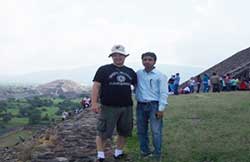APS International Research Travel Award Program, IRTAP: Providing Support to International Collaborators
Michele Irwin

APS travel award recipients Douglas Singleton and Sujoy Modak on the “Sun Pyramid” of Teotihuacan
The APS International Research Travel Award Program (IRTAP) — formerly the International Travel Grant Award Program (ITGAP) — was established by the Forum on International Physics (FIP) in 2004. The program was created to support scientific collaborations between developing and developed country scientists. FIP believed that one way to help sustain international collaborations was by providing modest funds to support travel, which could often be difficult to obtain. Through this program, grantees are awarded up to $2,000 that can be used towards travel to visit and conduct research with a collaborator abroad for a minimum of one month. rants are awarded twice a year for a total of ten (10) grants per year. The program has been made possible — and has grown significantly — thanks to generous support from APS units including all of the APS divisions, FIP, the Topical Group in Gravitation (GGR), and the Topical Group on Magnetism and its Applications (GMAG). IRTAP has also received support from the APS Presidential Line, the APS Office of International Affairs, and the U.S. Liaison Committee for the International Union of Pure and Applied Physics. As a result, APS has been able to award fifty-nine (59) grants to two-person collaboration teams since the program’s inception. The grants have benefited scientists from thirty-six (36) countries, in addition to the United States.
Successes
Grant recipients regularly report that the travel grants from APS have been invaluable to their collaborations. The grants can be the key to maintaining a long-distance collaboration or demonstrating to other potential funders that a research project has the support of the scientific community. One grantee from Venezuela, for example, recently reported that the “APS travel grant has allowed us to plan our short-term and long-term projects more consistently” and has also resulted in matching funds from other organizations. Further, the grant from APS “resulted in funding support…to participate to topical meetings…we would not have been able to accomplish what we did without the APS travel grant.” One of the key aspects of the program is the expectation that applicants will seek out funding from other sources to support their projects. Securing and/or applying for matching funds is viewed as a positive factor in the IRTAP application process. In addition, it is hoped once a collaborative team receives APS support that this will lead to support from other sources, creating a snowball effect. Happily, there is evidence that this has been the case for many projects supported by IRTAP grants.
Other grantees have reported that important advances were achieved in their research collaborations that were supported by the IRTAP grants. Many grantees have indicated that they continue to collaborate and have had additional face-to-face meetings. In some cases, the grant was vital to bringing a colleague into the mainstream international physics community or to publishing their first article in a high-impact journal. The collaborations supported by IRTAP have resulted in publications, book chapters, conference papers and presentations. Reports from grantees note that the APS support has helped advance the collaborators’ research and led to further collaborations.
Applying for a Grant
Members of APS units that sponsor IRTAP are eligible to apply. Specifically, one of the two co-applicants must be a member of one of the sponsoring units, i.e., the APS Divisions as well as FIP, GGR, and GMAG. In addition, one of the co-applicants must be from a developing country and the other co-applicant must be from a developed country. While APS does not maintain a list of developing countries — in order to keep the program inclusive and flexible — the IRTAP review committee often references the World Bank's "List of Economies" for guidance. APS also recognizes that there are pockets of underdevelopment in some regions or countries that could be considered ‘developed’ or ‘emerging.’
When applying for a grant, strong consideration is given to proposals that demonstrate three important characteristics: merit, need and evidence of other support. In particular, strong proposals 1) demonstrate a past record of research accomplishments and the promise of future accomplishments, 2) include invited talks to be delivered during the trip, especially talks at APS-sponsored meetings, 3) benefit under-represented countries and ethnic groups, and 4) demonstrate financial support (i.e., leverage) from other sources. Proposals that can demonstrate a benefit to graduate students and early career scientists are also viewed positively.
APS issues a call for proposals twice a year. The next deadline will be announced in the fall. For anyone interested in applying, keep in mind that IRTAP applications are submitted online and should include the following information:- Narrative proposal that includes:
- Explanation of the role of the principals in the collaboration
- Explanation of the expertise or facilities that each co-applicant brings to the proposal
- Description of how the collaboration became established
- Lists of the most relevant publications of each of the co-applicants, including papers co-authored by the co-applicants, if relevant
- Statement of financial support from other sources, i.e., demonstrating leverage
- Indication of which co-applicant is a member of one of the APS units that sponsors IRTAP
- Outline of benefits to junior scientists, students, or post-docs from a developing country
- Description of the travel plan and budget
Visit the IRTAP website for additional information about the program. Also, FIP members should feel free to contact me at irwin@aps.org or (301) 209-3237 with any questions they have about IRTAP.
Michele Irwin is the International Programs Administrator at APS.
Disclaimer - The articles and opinion pieces found in this issue of the APS Forum on International Physics Newsletter are not peer refereed and represent solely the views of the authors and not necessarily the views of the APS.
